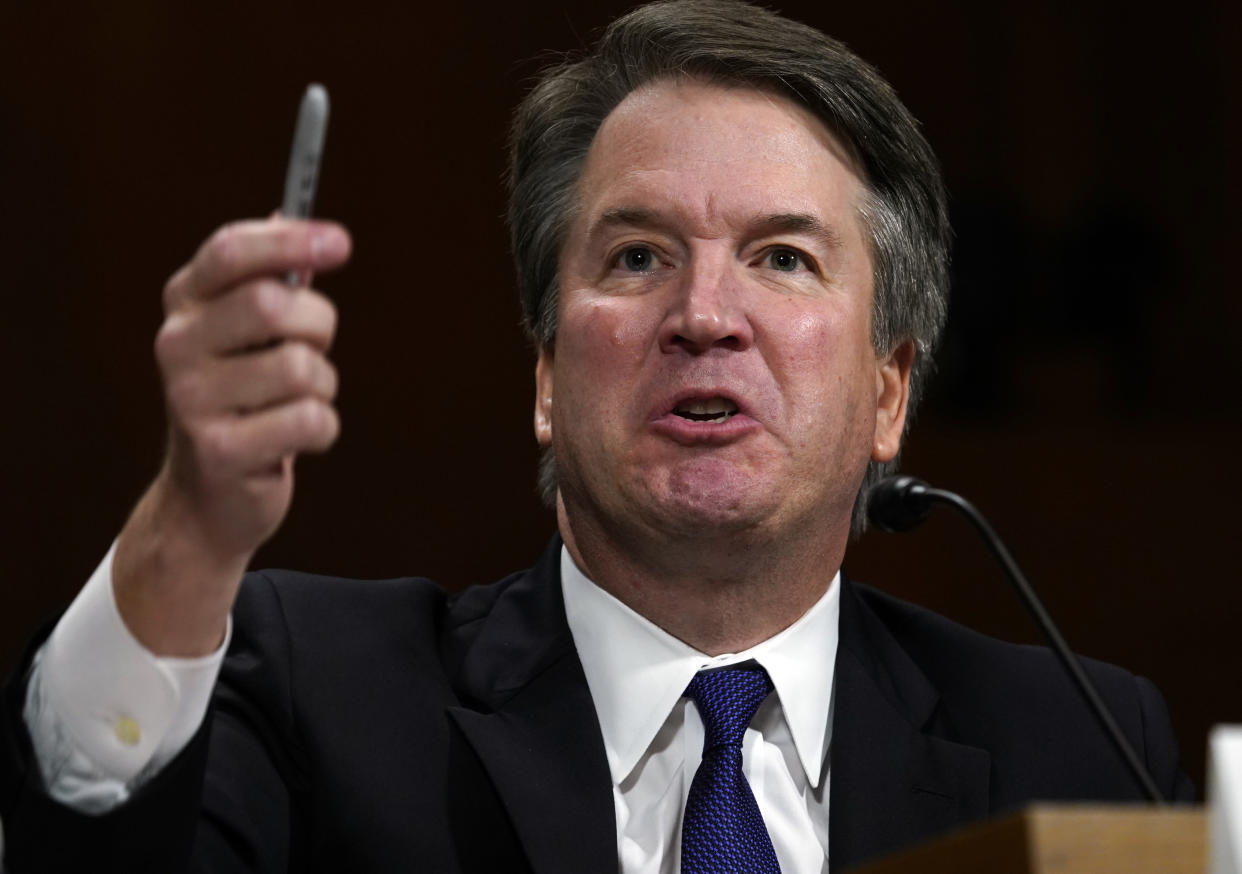Kavanaugh's recusal in securities fraud case could be good news for the SEC

The Supreme Court heard arguments Monday in a securities regulation case that will decide whether those who use false statements in solicitations can be held liable, even if they themselves did not make the false statement.
Only eight of the court’s nine justices will rule in the matter, with the court’s newest appointee, Justice Brett Kavanaugh, having recused himself based on his role as a judge in the lower court’s decision. Kavanaugh’s recusal leaves the case to be decided by justices evenly split on the liberal-conservative spectrum.
“You now have four Democrats and four Republicans on a case that closely divided the Supreme Court in 2011,” John Coffee, securities law expert and professor of law at Columbia Law School, told Yahoo Finance.
If the case ties, as Coffee suspects it will, then a lower court ruling that was largely in favor of the SEC will stand — bucking a current trend in the Supreme Court of cutting back on securities litigation.
‘A new definition for who was liable’
In the case before the court, Lorenzo v. Securities and Exchange Commission, the SEC fined and permanently banned petitioner and investment banker Francis Lorenzo from the securities industry after it was discovered that he had emailed prospective investors communications containing false statements drafted by his supervisor.
Lorenzo argues he should be protected from liability for his supervisor’s false statements because of a 2011 Supreme Court decision, Janus Capital v. First Derivative Traders, that says primary liability under Securities and Exchange Commission Rules may be imposed only on people or entities with “ultimate authority over” a false statement. Liability, the court said, does not extend to those who prepare or publish a statement on behalf of another.
“They came up with a new definition for who was liable for a false statement,” Coffee said of the court’s controversial ruling. It allowed, for example, lawyers, accountants and corporate executives to draft statements and make revisions, yet avoid liability if not designated as the ultimate authority over the statement.
The SEC argues that it should be able to hold Lorenzo liable under an alternate SEC provision prohibiting false statements with intent to deceive, manipulate, or defraud as part of a “scheme.”
“The SEC has gone after Mr. Lorenzo to discipline him,” Coffee said. “This an SEC enforcement action against Lorenzo because the SEC [says] he was participating in a scheme to defraud his clients.”
Is sending an email enough to make somebody liable?
Robert Heim, an attorney for Lorenzo, told the court in oral arguments that Lorenzo’s email does qualify for primary liability.
“In order for Mr. Lorenzo to have become a primary violator, he would have had to engage in more active misconduct,” Heim said.
“If sending an email that was prepared by somebody else constitutes enough of an action to constitute primary liability, it would really leave no room for any sort of aiding and abetting liability. It would convert anybody that, perhaps, gives some sort of substantial assistance to a primary violator.”
Justices from both sides of the ideological question asked why Lorenzo’s conduct — sending emails containing materially false statements to prospective investors — was not enough to make him a primary actor.
“Maybe he didn’t make the statement, but he was sure a big deal participant,” Justice Breyer said.
“I mean, there’s no doubt about it. He did a lot to help,” Justice Neil Gorsuch also acknowledged, yet raised a distinction promoted by Lorenzo’s attorney. “But he didn’t engage in any independent conduct that created a false impression in the mind of the other, other than disseminate the false statement that did that.”
“This is not simply retransmitting the statement,” attorney for the Justice Department, Christopher Michel, argued. “He sent the emails on behalf of the investment banking division, which is exactly what his boss calculated would make the statements more misleading.”
Michel said Lorenzo’s gross misrepresentation and backing a business that he knew was failing constitute a quintessential securities fraud meant to fall under the SEC’s provisions for primary actor liability.
‘I suspect we’ll see the four justices continue to dissent’
The D.C. Circuit Court of Appeals in a 2-1 decision, with Kavanaugh dissenting, said that while Lorenzo could not be held liable for fraudulent misrepresentation based on “making” a false statement, he could be held liable under “scheme liability” based on participation in a scheme to defraud investors.
If the justices split 4-4, as suspected, the Circuit Court’s ruling stands. In the 2011 case that in part guides the Lorenzo case, Justice Clarence Thomas wrote the majority’s 5-4 decision, with Justices Breyer, Ruth Bader Ginsburg, Sonia Sotomayor, and Elena Kagan dissenting.
“I suspect we’ll see the four justices continue to dissent,” Coffee said of the Lorenzo case, which would mean the Circuit Court’s ruling against Lorenzo stands.
“If the Supreme Court reversed the D.C. Circuit it would be part of a pattern of gradually cutting back on securities fraud litigation; however, with the recusal it’s very questionable whether this case will play into that pattern.”
Alexis Keenan is a New York-based reporter for Yahoo Finance. She previously produced live news for CNN and is a former litigation attorney. Follow her on Twitter at @alexiskweed
Follow Yahoo Finance on Twitter, Facebook, Instagram, Flipboard, LinkedIn, and reddit.
Read more:
Apple faces massive legal risk, and it’s not about iPhone demand or tariffs
Weed is legal in 3 more states — here’s what to expect from the new laws
Why Philadelphia halted plans to unleash e-scooters across the city
Here’s how eBay alleges Amazon illegally lured its ‘high-value’ sellers
Winning the Mega Millions is sweeter in some states than others

